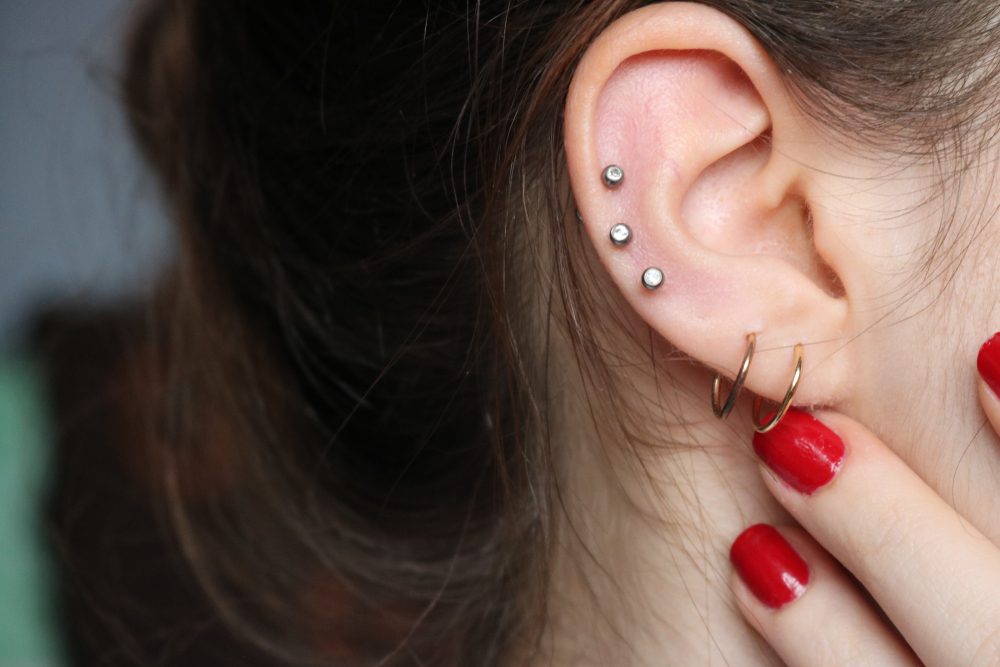In an ideal world, you would get your ears pierced and get rocking wearing adorable earrings every day of your life.
In truth? Without sugarcoating it, it may be really unpleasant when piercings become infected.
Fortunately, infected ear piercings are rare. If you get ear piercing at a reputable shop and take good care of them afterward, you should be alright.
However, people can and do get infected piercings. Definitely something not good to deal with!!!
In this blog post you will get to know about causes of ear piercing infection, how you can treat, and prevent it. Keep reading!!
Table of Contents
How to Determine If Your Piercing is Infected? Symptoms to Look for
Finding out if your piercing is genuinely infected is the first step. Some of the common symptoms of ear piercing infection are:
- Pain
- Redness
- Swelling
- Yellow discharge
- Tenderness
- Burning/Itching
More severe infections can lead to:
- Fever
- Chills
- Swollen lymph nodes
What Causes Ear Piercing Infection?
In essence, a piercing is an open wound. It typically takes six to eight weeks for an earlobe piercing to recover. In general, cartilage piercings, which are done on the more durable area of your ear, take longer to heal and are more likely to become infected.
However, some of the common causes of infection in ear piercing are:
- Getting ear piercing in an unclean setting or using unsterilized tools, you run the risk of exposing your new piercing to dangerous microorganisms that may lead to infection.
- Using filthy hands to touch your ears.
- Taking off your earrings before the piercing has had time to heal.
- Not cleaning your new piercings every day.
- Exposing your new piercing to pool water, hot tub, lake, or river water before it gets healed.
Also get to know about belly button infection.
How Common are Infected Ear Piercings?
Many of the millions of people who have their ears (and other body parts) pierced experience no significant issues. However, for fresh piercings, mild discomfort and infections are typical.
In most situations, infections don’t progress too far and get better soon.
Strong blood flow is present in the fatty, fleshy earlobes. They recover rapidly, which lowers the chance of earlobe infection. On the other hand, the cartilage in the upper ear is a dense, rigid tissue that receives less blood. Infections in the upper ear can occasionally be very serious, and piercings there are more likely to get them.
How to Treat A Piercing Site Infection?
Unless the piercing is through cartilage, this is generally a small infection that you might try treating at home.
For minor infections in soft tissue, take these steps:
- Initially, wash your hands with soap and water.
- Then make a saltwater solution by adding around 1/2 teaspoon of salt to 1 cup (0.24 litres) of water. Stir, until the salt melts.
- Soak the cotton ball in the solution and place it on the afflicted area while keeping the piercing jewellery in place.
- Using fresh gauze or a tissue, gently pat the afflicted area dry.
- Then, as instructed on the product label, apply a tiny amount of an over-the-counter antibiotic cream (Neosporin, bacitracin, etc.).
- To keep the piercing jewellery from adhering to the skin, give it a couple turns.
- Up till the infection becomes well, repeat this three times every day.
Additionally, make sure your phones are clean, and switch your pillowcase every two days for a clean one.
Get to know more about home remedies for fungal infection in ear.
When to See A Doctor?
Seek the medical attention right away if you observe the following symptoms:
- If the ear piercing infection does not go away within a few days.
- If you have a fever.
- If the earring is immobile, or the earring becomes enmeshed in the skin
You may consult with the best dermatologists near you by making an appointment via Healthwire.
How Can I Prevent Pierced Ear Infection?
Prevention is always the key to any illness. You can also prevent the ear piercing infection by keeping in mind the following things:
- Get piercing done by a specialist to prevent infection, not at your house!!
- Make sure to inquire about their approach to preventing infections, for example, ask if their equipment is sterile as well.
- Verify that the earrings they wear were just removed from a brand-new, sterile container.
- Wash your new piercings twice a day with sterile saline.
- Before touching the cartilage or earlobes, wash your hands.
- Apply antibiotic cream or rubbing alcohol to the affected region twice daily.
- Despite the temptation, refrain from handling or playing with the jewellery excessively.
Final Note!
Most of the time, getting your ears pierced is a simple, safe procedure. Simply make sure to visit a skilled piercer who follows hygienic best practices. Also, keep your new piercings clean, and remove earrings only once they have fully healed.
Just be patient; if you take steps to avoid an infection now, you’ll be able to enjoy a healthy piercing for many years to come.
